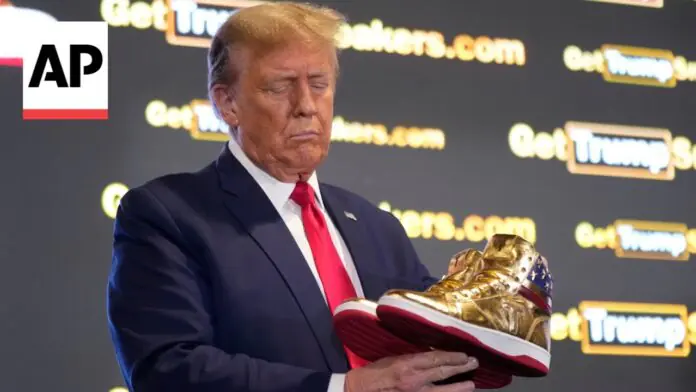Federal judge Alvin Hellerstein dismisses Trump’s claims of presidential immunity and bias, upholding the state court’s jurisdiction over his hush-money case
In a decisive ruling on Tuesday, Federal Judge Alvin K. Hellerstein denied Donald J. Trump’s request to transfer his criminal case from state court to federal jurisdiction. Trump’s appeal, which was based on claims of presidential immunity and allegations of judicial bias, was rejected by the judge, who ruled that the issues raised were not applicable to the federal court’s purview.
The case in question involves Trump’s conviction in late May on 34 felony counts related to falsifying business records. These charges stemmed from attempts to conceal hush-money payments made to adult film actress Stormy Daniels. Daniels had threatened to publicly disclose details of a sexual encounter with Trump from 2006, prompting the payments to be made as part of a cover-up.
Embed from Getty ImagesJudge Hellerstein’s four-page decision refuted Trump’s arguments that presidential immunity should apply. The judge clarified that the payments in question were “private, unofficial acts” rather than actions performed in the course of Trump’s official duties as president. Consequently, Hellerstein found no basis for Trump’s claims that these actions fell within the scope of presidential immunity as defined by recent Supreme Court rulings.
Trump’s legal team had also alleged bias within the state judicial system, but Judge Hellerstein noted that such issues are better addressed by state courts rather than federal ones. This ruling marks a setback for Trump, who has been actively seeking ways to avoid the repercussions of his conviction, which could result in either probation or a prison sentence of up to four years.
Trump’s sentencing is set for September 18, less than seven weeks before the presidential election, where he is vying for the presidency against Vice President Kamala Harris. The timing of the sentencing has been a point of contention for Trump, who has requested a delay until after the election. His legal team argues that this would mitigate potential concerns about the integrity of future proceedings.
In response to Hellerstein’s ruling, Trump’s spokesperson, Steven Cheung, criticized the decision and reiterated the campaign’s stance against the charges. Cheung branded the case as a “Hoax” and called for an end to what he described as an “Election Interference Witch Hunt.”
Justice Juan M. Merchan, who is overseeing the sentencing, had previously agreed to a postponement following a Supreme Court ruling in July affirming presidential immunity for acts performed within official duties. However, the latest Supreme Court decision did not impact the charges against Trump, as argued by Manhattan prosecutors. On September 16, just two days before the scheduled sentencing, Justice Merchan is expected to rule on a separate motion by Trump’s legal team seeking to overturn the conviction based on the same Supreme Court decision.
Prosecutors argue that the recent Supreme Court ruling has no bearing on Trump’s conviction, maintaining that the case should proceed according to the state court’s judgment.
Analysis:
Political: Judge Hellerstein’s decision reinforces the separation between state and federal jurisdictions in handling criminal cases. By denying Trump’s request to move his case to federal court, the ruling emphasizes the independence of the state judiciary in dealing with criminal charges against high-profile individuals, including former presidents. The timing of the sentencing, set just before the presidential election, adds a layer of political drama to the case, potentially influencing public perception and the electoral race.
Social: The denial of Trump’s request highlights ongoing societal debates about accountability and justice for public figures. Trump’s conviction and the subsequent legal manoeuvres reflect broader concerns about how legal systems address crimes committed by individuals in positions of power. The public’s reaction to these proceedings is influenced by partisan perspectives, with Trump’s supporters viewing the case as a political attack, while critics see it as a necessary measure of legal accountability.
Racial: While the case does not directly address racial issues, it intersects with broader societal discussions about fairness and justice. High-profile cases involving prominent figures often provoke scrutiny of the legal system’s impartiality and the equitable treatment of all defendants, irrespective of race or status. The focus on Trump’s case can indirectly impact conversations about race and justice in the broader context of the American legal system.
Gender: The case involves allegations of hush-money payments related to a sexual encounter, which brings gender issues into focus. The coverage of the case highlights gender dynamics, particularly in terms of how sexual misconduct is addressed legally and publicly. The involvement of Stormy Daniels and the nature of the allegations underscore ongoing discussions about women’s voices and experiences in legal contexts.
Economic: The legal battle, including potential imprisonment or probation for Trump, carries economic implications for his political campaign and future endeavours. The case’s outcome could impact campaign fundraising, public support, and Trump’s financial stability. Additionally, the legal expenses and potential penalties associated with the case have broader economic ramifications for Trump and his campaign’s financial strategy.
